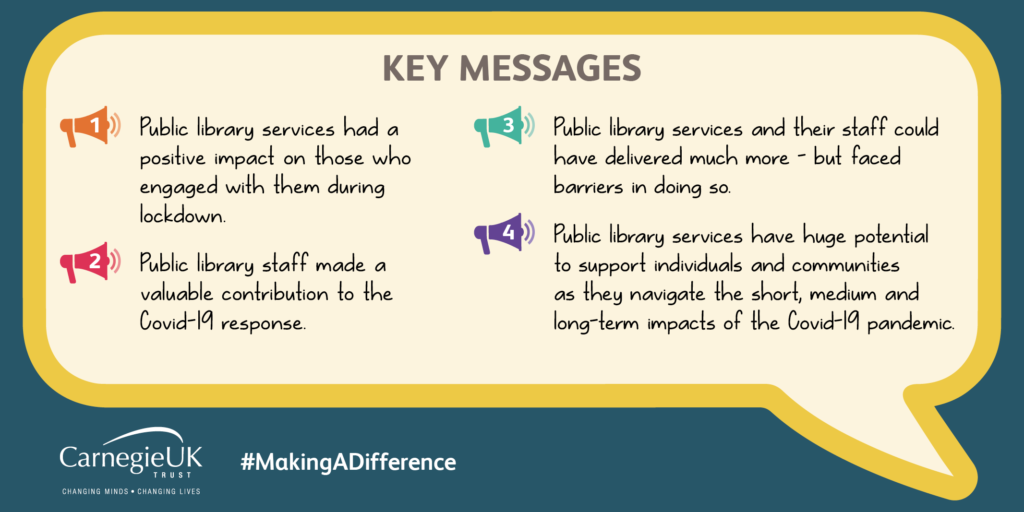Working Towards Wellbeing: Public Library Services in Lockdown
Category: Blog
This is a guest blog by Dr Jenny Peachey, Senior Policy and Development Officer, Carnegie UK Trust. Jenny will be speaking the this year’s CILIPS Annual Conference.
Public library services across the UK had a positive and supportive role to play during the Covid-19 lockdown. Our new research reveals that 3 in 10 adults (an estimated 15 million adults) engaged with public library services during lockdown. Of this number, 64% said it had a positive impact on their wellbeing; 63% said it helped them feel more connected to their community; and 60% said it helped them feel less alone.
These figures, derived from a public poll of 2,196 adults across the UK, speak volumes about how public library staff worked hard to deliver services in extremely restricted circumstances. It also speaks of the impact of staff’s efforts to increase available e-resources, convert activities into digital formats, reach out through wellbeing phone calls, support people over the phone with questions about tech, and expand home delivery services to reach more people (such as those who were shielding) and provide more forms of support, (such as activity packs for children).
Outside of the library service, staff that were redeployed evidenced the transferability of the library skill set. Indeed, it is clear that some of the specialist outreach services implemented by local authorities in lockdown required or mirrored the core skill set that library staff deployed day-to-day pre-Covid-19, from customer service to information and knowledge management,.
Yet, research findings also show that library services’ ability to respond to community need and the nature of their response was highly variable. The staff survey reveals how the same services and activities were a source of pride for those services that were able to deliver them, and a source of envy for those who were unable to do so. This discrepancy in quality and quantity of offer not only affected members of the public who, depending on where they lived, were to a greater or lesser degree able to come into contact with their public library service, but it affected staff themselves. Staff morale and wellbeing was influenced by the pride they were able to feel in their service and their ability to contribute during lockdown.
There is no question that as a welcoming space at the heart of communities, free at the point of access and open to all, with a network of physical spaces and skilled staff, public library services have incredible potential as social infrastructure. They have a role to play in relation to strengthening communities.
But what would it take for public library services to fulfil this potential moving forward? Based on what staff across the UK and our Heads of Service interviewees told us, the answer is a range of things: a sustainable financial settlement; a stronger voice in local authority structures; an excellent blended physical and digital service and ongoing service innovation; investment in staff and organisational culture; and powerful and effective advocacy. It is a matter of increasing urgency and importance that these areas are addressed in order to enable public library services to fulfil their potential and deliver for the individuals and communities they serve.
